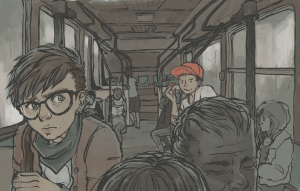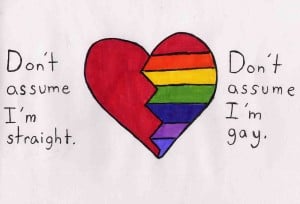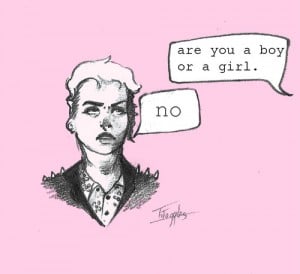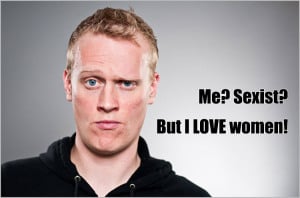Originally published on Medium and republished here with the author’s permission.

Closeup of a person staring off to the side as they walk a city street at night.
“Why do you always engage them? If you didn’t engage them, they wouldn’t keep talking to you.”
It is nighttime and it is bitterly cold and I’m at a bus stop with my then-boyfriend. We’ve just left a performance of some sort and are trying to get home but our evening has been interrupted and it is, apparently, my fault.
An intoxicated man stands about two feet away, swaying like a thin tree in the wind, staring at me with a fixed gaze. He appears to be living in extreme poverty, most likely sleeping outside tonight, and, just moments ago, I was worrying about how he’d stay warm.
I’m still worried, but now I am also annoyed, mostly on behalf of my boyfriend, who is visibly upset by the encounter.
The man’s knuckles are wrapped around a garbage can and his other hand is beckoning me with one finger. He has already spoken to me, too close and smelling like hard liquor, about my body and my appearance. He keeps pinballing from his garbage can to me and back again, prompting me to talk to him. This goes on for at least 10 minutes, during which I am courteous and my boyfriend grows more and more anxious.
The sexual harassment isn’t what irritates me. For me, this isn’t frightening or even that uncomfortable. This is every single day.
I leave the house. Men talk to me. I hold my breath and I am polite and I am unshakable and then I get home. Repeat. Repeat. Repeat.
What annoys me is the fact that I am being blamed for this moment in time, for this interaction. While this isn’t new to me – this is the price of living my life, of going to things – it is new for him. And he doesn’t enjoy it.
“Just don’t talk to him. He’ll go away,” my boyfriend tells me again. His face is pale and he is clearly nervous and perhaps downright afraid of what the man will do to us – to him – next.
I’m not afraid, because I’m doing what I have learned to do to keep us both safe. The exact thing that my boyfriend thinks is causing this interaction is the thing that I know will ensure it is over more promptly and without incident.
I remain courteous as we wait.
Sometimes when I get home, I tell my boyfriend about the persistence of interactions like this, the pervasiveness of it. He seems aghast, but I get the feeling that he, like of a lot of men, think I’m exaggerating.
I can’t entirely blame him; most people have a hard time grasping the gravitas of a situation until they, themselves, have experienced it. He’s never seen this happen in public. He’s never had it happen to him.
And, of course, he has told me to just ignore it because that seems like the most logical approach. When you ignore things, they go away, right?
This time, though, he bears witness. His presence at my side does nothing to dissuade the drunk man because, as much as men like to think that just being there is enough to protect women from other men, that is rarely the case.
Example: The time a man on a Greyhound bus put his hand on my leg and physically blocked my path as I tried to wriggle away while the man on his side, someone’s white-collar business dad lured in by the promise of nicer seats and outlets on the bus, looked worried but said nothing.
Example: The time a customer cornered me in the alley outside of the restaurant where I worked during a cigarette break and two college men lingered with a concerned air, but ultimately decided to keep walking.
Example: The time a man who was visibly having a mental break swung a padlock at me and threatened to “smash your face, bitch” despite the company of an extremely nervous male friend who was very graciously walking me home “for safety.” He asks after the fact how I could remain so calm and I just shrug.
Example: The time when, walking with my current partner, a drunk man stumbled from a bar and waved a golf club in our direction and it was me that he locked his eyes upon, but my partner who was the most upset. I oblige the imposition just long enough to steer us into a bodega until the man leaves.
It’s hard to even be disturbed by an occurrence that happens so often because if I were to allow myself to feel it every time, I would never be able to leave the house again .
This is something I’m reminded of whenever a man is present for an incident like this and is so very visibly shaken and at a loss for what to do or how to react.
Seeing it happen this time, though, doesn’t seem to breed empathy in my boyfriend. Instead, it confirms everything that he believes. I didn’t ignore the man, and now he’s here, in our presence, in our life, wicking up our time and attention like water.
I smiled and I was polite and that is why he talked to me — though of course, I was paying exactly no attention to him before he began to demand mine. I was doing exactly nothing to invite this man’s leering and sexually aggressive language, except for existing as a woman, which for many men is more than enough.
“Seriously, stop being nice to him. You’re making it worse.”
This conclusion exhausts me because we have been over this and he should know better and I am tired of holding the hands of men in my life while also keeping my fists clenched as men I don’t know penetrate my space and expect my time.
It’s also decidedly untrue. He doesn’t know what makes it worse, because he hasn’t lived it every day. He has gathered much less anecdotal data than I have.
He is a man who is, for all intents and purposes, considered one of the “good ones.” He participated in Walk a Mile in Her Shoes. He has seen the Vagina Monologues. He has read Judith Butler and bell hooks and he knows about the male gaze and the Bechdel Test. He would never harass a woman on the street. He would never blame the victim.
Except right now and every time it happens to me. This is still my fault. I did this. That man is making my boyfriend uncomfortable because of me.
This is the thing about being an ally – it requires very little nuance of understand. Catching the sexism in a beer commercial? You’re an ally. Lamenting the gender wage gap? You’re an ally.
Blaming women for the behavior of men in everyday occurrences of sexual harassment? Well…
***
The men who yell repulsive things about me from their cars or on the street. The men who follow me home. The men whose hands slip up the back of my skirt as I squeeze by for a seat on the bus. The men who wave their limp, rubbery genitalia at me in broad daylight. The men who have said they loved me and also raised a hand to me.
They do it, the world still seems to think (despite so. many. articles. like this.) not because we have told them all their lives that my body is their property and my attention their right, but because I have smiled or dressed or walked or existed in a way that gave them the green light.
Nevermind the fact that talking, smiling, and existing in a passive, polite, and permissive way has actually saved me.
Nevermind all of the times when a man has turned quickly, like flipping over a playing card, from seemingly warm and charming to frightful and alarming when I even implied that I didn’t want to talk.
Nevermind the fact that one time a man at a bar whose advances had just become too much to stomach literally spat in my face when I told him I was really just trying to read alone.
Nevermind the fact that telling a lecherous man on the corner not to fucking talk to me one day when I was just so tired of being treated as a consumable good prompted him to show me his knife and tell me to be grateful for his “compliments, fat bitch.”
Nevermind the assumptions that come from a simple no:
You think you’re too good for me? or What, so you’re a lesbian. or Didn’t anyone ever teach you it’s not polite to ignore people?
Funnily, no, and in fact, people keep telling me to do the exact opposite.
And then there’s that question – shouldn’t you be grateful? Doesn’t it feel good to have so many people interrupting your day just to show their interest? Wouldn’t anyone love to be showered with compliments at unexpected moments?
But of course the answer is no, because the majority of the words that I hear are not meant to be kind. They are meant to be corrosive.
Many men go through the world feeling invisible, which is the fault of toxic masculinity and also the fault of their fellow men. When your ears are, as a woman, full of “compliments” that sound more like threats, every advance becomes just noise, every encounter a potentially dangerous or uncomfortable situation.
We are told to ignore sexual harassment… unless it’s from a nice guy. We are expected to know the difference immediately and react appropriately. We often get it wrong because there is no right answer.
And yet, it’s men who tell us how best to handle these situations. When in fact, it is we, the victims, who know best.
In my life, it has become abundantly clear to me that there is no way for me to end the constant barrage of unwanted conversation and touching and sexualization of my body. There is nothing that I can do to stop giving tiny pieces of myself and my time on this earth to the men who demand it because there is nothing that I can do to stop the demand. That’s not on me.
It happens regardless of what I’m wearing, regardless of how I feel, regardless of how I move through the world. It’s not what I do and it’s not how I act. It is my presence – and just that!
Sometimes it’s with good intentions. Sometimes it’s not. Sometimes it’s with no intention at all other than to interrupt and interject – someone just has something they want to say or do to me and they can see exactly no reason not to say it or do it.
It’s not a question of if it will happen, but when and how often. How many times today. How many times for the rest of my life. How many will go sour. How many will end with me in danger.
I can’t make it stop and I can’t reduce the volume. What I can do is ensure that it’s not worse.
And so I smile. And I make conversation. And I am charming and sweet and I even swallow hot stomach acid to choke out the words “thank you,” because these are the actions that, it has been proven to me over and over by trial and error, work best.
A small smile heads off the rage. A wave back keeps the situation civil. A forced laugh keeps the man outside of the drugstore from following me any further. A full-fledged conversation when I am trapped in line helps me suss out whether or not this person is violent, or just overly-friendly.
It’s tiresome and it’s not ideal. It leaves me wary and makes me guarded. It prompts me to consider every single interaction I have in public.
There’s an innate unfairness to this; for the men who harass me, who invade my space and demand my time and attention, who grant themselves permission to touch me, this is a pleasant experience. They feel listened to and visible and valued and validated.
It has the opposite effect on me.
And yes, I know that in doing this – in using courtesy as a weapon of self defense – that I am also actively enabling the behavior and I am encouraging it further and I am part of the problem.
I would rather get home safe at night than take up the charge of ending male entitlement when it stumbles my way because the truth is, my compliance doesn’t cause male entitlement and my lack of compliance isn’t enough to make it stop.
If I stop using politeness as my armor, I won’t correct centuries of conditioning and acceptance and even encouragement. I won’t make a man who thinks my body is his for the taking to reconsider a lifetime of training that tells him that’s the case.
I won’t end anything except, potentially, my own life.
If I stop complying, the most likely outcome is that I will harmed. The most likely outcome is that nothing will change except instead of being irritated by harassment, I will go back to being actively afraid or, you know, worse.
For this reason, each day, I decide to be temporarily okay being part of the problem because I know that my part is the absolute smallest part. I also decide to be part of the problem because the alternative – ”just ignoring it” – is part of the problem.
Of course, telling women to “just ignore it” is another way of telling women to be quiet. If we’re quiet, we’ll be safe. If we’re quiet, they’ll go away.
If we’re quiet, all of the men who don’t harass women, who don’t help themselves to our bodies, can feel better about their own silence.
***
On this exact night, with this exact man who should know better because he prides himself on understanding and hearing women, the tiredness overwhelms me and I can’t be part of it anymore.
“No, actually, he won’t. He won’t go away and he won’t leave us alone and actually ‘engaging’ is one of the best ways I know how to keep myself safe.”
And we’re off.
For the entire bus ride home (the bus finally comes) I unload all of little scraps of indignity that I have packed around with me for all of these years. And I don’t care if he hears it or learns a goddamn thing because mostly I just need to say these things. These things that I have said above and many more.
Things like “harassment is not the same as giving a compliment” and “telling women to be silent does nothing to solve the problem” and “saying that my actions cause this is exactly what we mean when we say ‘victim-blaming.’”
***
In the years since that night, I have told this exact story many times, to many men, in large part because being silent – just ignoring it – doesn’t make women safer and I need you to know that.
I just need you to know that.
When men are quick to remind us that not all men harass women, I’m quicker to remind them that all women (really, all) have experienced this at least once, but more likely, they have experienced it many, many more times than that.
And as many times as we’ve been party to this – as many times as someone has touched us, yelled at us, hit on us, hit us, raped us , spat on us, stalked us, threatened us, propositioned us – we’ve also been told to just ignore it.
The truth is, we don’t have the luxury to ignore harassment. We engage, we’re kind, because that is what keeps us safe.
And now it’s time for everyone to engage.
If you’re tired of hearing about women being harassed, tired of us sharing our stories about it, maybe that’s because you’ve been ignoring it, and we don’t believe that you should have that luxury anymore, either.
Search our 3000+ articles!
Read our articles about:
Our online racial justice training
Used by hundreds of universities, non-profits, and businesses.
Click to learn more




















